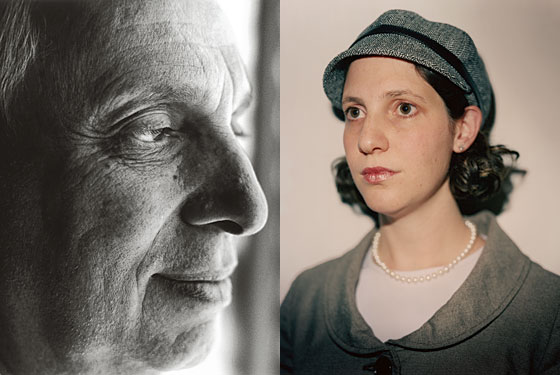 |
|
From left to right, Rabbi Avi Weiss and Rabba Sara Hurwitz.
(Photo: Andreas Laszlo Konrath) |
“Where is the drumroll?”
Rabbi Avi Weiss looked ebullient. He was facing the congregation on a Sunday morning in March of last year, at the Hebrew Institute of Riverdale, the synagogue he founded nearly 40 years ago. His white yarmulke was bobby-pinned to his white hair, a broad smile lifting his jowls. In a few minutes, he would ordain the first woman in American Orthodox Judaism.
This so-called conferral ceremony honoring Sara Hurwitz, a 32-year-old mother of three, was unprecedented, and everyone in the room knew it. Orthodox rules strictly delineate gender roles in all aspects of life, especially in synagogue, and these divisions go a long way toward defining what Orthodoxy stands for. Avi Weiss is not one for subtle gestures, yet even he recognized that this ordainment would require an unusual level of political finesse. He had picked his protégée’s title cautiously, choosing not to dub her rabbi—too loaded an honorific—but rather a new designation he’d invented: maharat, a Hebrew acronym, he explained, which stands for a legal, spiritual, and Talmudic leader.
Someone drummed on a chair, obliging Weiss’s request. “The authority of Torah will rest upon her shoulders,” Weiss proclaimed dramatically, “to spread the knowledge of God throughout the land.” Large hands planted firmly on the lectern, Weiss gazed like a father at Hurwitz, who sat smiling back, dressed in a plain black suit, cloche hat, and pearls. “Sara, what you have achieved today is distinctive. It’s set apart.” He told his audience how well versed Hurwitz had become in Jewish law—Halacha—as if to anticipate any questioning of her bona fides. “Sara, under the tutelage of Halachic experts, has studied the established traditional rabbinic texts that are required to become a religious leader and, based on her mastery of these texts, is assuming a full religious leadership position in a synagogue.” With open hands, he gestured to her. “We bless you as you rise and come forward to join me in officially becoming part of the religious leadership of Israel and officially becoming a full member of our clergy!”
The crowd cheered.
“You have risked so much to stand behind me,” Hurwitz said to Weiss in her acceptance speech. “It is my dream that young Orthodox girls will be able to say, ‘When I grow up, I want to be a maharat and serve in the capacity of female Orthodox rabbi.’ ”
No one seemed to flinch. In fact, in the weeks that followed, it appeared that Weiss had accomplished something else unprecedented: a significant challenge to Orthodox rabbinical codes that had avoided waking the lions of the Establishment. This is not how he typically conducts business. Though described by his congregants as soft-spoken and gentle, he has, over the past three decades, built a career out of confrontation. He is known for his unrelenting political activism, championing causes from Soviet Jewry to clemency for Israeli spy Jonathan Pollard. Few can keep track of the number of times he’s been arrested, threatened, and lambasted. Within the Orthodox community, Weiss has been equally disruptive, agitating for what he calls an “open Orthodoxy,” which he believes can be inclusive without breaching the tradition’s stringent parameters.
This morning’s ceremony appeared to represent a quieter radicalism—no news conferences, no protests. Perhaps, even, it was a glimpse of a new Avi Weiss: as crusading as ever, but, at 64, grown wise to the benefits of diplomacy.
Those in the congregation who knew Weiss best knew better.
Six years after having first discussed with Hurwitz the outsize notion of her studying to be accepted as an Orthodox rabbi, Weiss approached her ordination at a loss for what to call her. His longtime friend Blu Greenberg, who founded the Jewish Orthodox Feminist Alliance, convened a kind of focus group to help him figure it out. On two separate evenings at her house in Riverdale, Greenberg invited about two dozen prominent Jewish women—and a few men—to eat poached salmon and wrestle with the question of what title Hurwitz should be granted and whether Orthodox Judaism could accommodate her ordination.
Everyone present agreed that Hurwitz represented something seismic. “I think everybody was in amazement that she had achieved this,” says Reform rabbi Jacqueline Koch Ellenson, who attended a meeting. Hurwitz had put in three years of learning at Manhattan’s Drisha Institute, then repeated the course work under Weiss’s supervision, this time with an eye toward psak: being equipped to weigh in on intricate questions of Jewish law. “Sara completed everything,” Ellenson continues. “She bucked the system. So what happens next? Do you let her in?” Some were afraid that by ordaining Hurwitz, Weiss would jeopardize his synagogue’s funding; others expressed concern about the impact on “his boys,” as some refer to his students from the already-controversial yeshiva he created. But after hours of discussion, the group was largely in accord: Hurwitz should be named rabbi, or, failing that, rabba.